Dare to Be First
by Graham HaysThe inside story of Vanderbilt volleyball’s first recruiting class
NASHVILLE, Tenn. — Vanderbilt’s inaugural Southeastern Conference volleyball match was more than two years away as Anders Nelson sat in a Kansas City restaurant this past February. The familiar rush of adrenaline and camaraderie that defines competitive athletics washed over him all the same. Never mind that his roster was notional, Vanderbilt’s program then little more than the three people seated around the table. Never mind that instead of the roar of a crowd inside a packed arena, the backdrop was the murmur of conversation from nearby diners.
History was beginning, and it was time to find the student-athletes who wanted to write it.
For one weekend each year, the college volleyball community convenes in Kansas City for the Triple Crown NIT. A three-day tournament featuring more than 500 youth club teams and thousands of the best recruits, Triple Crown is one of the biggest events on volleyball’s recruiting calendar. For Vanderbilt, it was in many ways a public debut.
With matches set to begin the following morning and the NCAA recruiting evaluation period officially open, Nelson dined with assistant coaches Russell Corbelli and Lauren Plum. Once matches began, coaches found food when and where they could in and around watching 12 or more hours of volleyball each day. But in that evening’s calm before the serves, Nelson felt a surge of gratitude for the new colleagues alongside him. Just weeks earlier, they had been strangers, rising talents in the profession whose paths had crossed only occasionally. Now, as they absentmindedly plucked food off each other’s plates and mapped out weekend priorities, there was no one he trusted more to shape the vision for what was possible at Vanderbilt.
Underlying it all was a nervous excitement—the feeling that comes in the biggest of moments—like that surrounding his team winning a national championship two years earlier. The feeling that comes just before you do something you’ll never forget.
“I had lost that a little bit, the butterflies, because I’ve been doing the same recruiting routine for 12 years, just grinding and grinding,” Nelson said. “It was cool to feel that fresh excitement to get out there. It was cool to feel excited about wearing Vanderbilt across our shirts and showing the world ‘Hey, Vanderbilt volleyball is here. And we’re going to start recruiting some of the best players in the country.’”
Nelson, Corbelli and Plum were there to find the first student-athletes to play volleyball for Vanderbilt in more than four decades. In Kansas City, and in visits to countless other tournaments, high school gyms and dining room tables across the country, they found Reese Animashaun, Maddy Bowser, Taryn DeWese, Hailee Mack, Giovanna Mason and Rachel Ogunleye.
They found the first new volleyball Commodores.
Talking to elite high schoolers who were generally used to seeing results go their way, Nelson saw his share of blank stares when he spoke about adversity and the challenge of being first. Some might have been skeptical about his goal of seeing the first class compete in the NCAA Tournament before they graduate. But more often than he might have expected, he saw a smirk or a smile tug at someone’s mouth.
“Those are the athletes that we gravitated to,” Nelson said. “One of the things that we’re looking for in our recruits right now is courage. They have to have the courage to get outside their comfort zone and do hard things. When they’re smiling as I’m explaining how hard it’s going to be, that was a pretty good indicator that they probably fit in well with us.”
Animashaun, Bowser, DeWese, Mack, Mason and Ogunleye were six women who, as the sign in Nelson’s office reminds visitors, weren’t satisfied being next.
Six women who dared to be first.
“I wanted to be very clear that it’s going to be hard,” Nelson said. “But I also think it’s going to be the most rewarding experience that they’ve ever had in their lives. That’s what we’re working tirelessly toward now, to provide that environment where they can grow and thrive.”
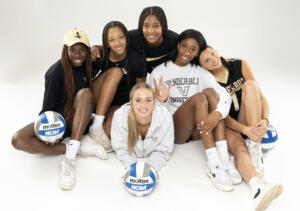
The first Commodores. Sitting or kneeling, from L to R: Gigi Mason, Rachel Ogunleye, Maddy Bowser, Reese Animashaun, Hailee Mack. Bottom middle: Taryn DeWese (Joe Howell/Vanderbilt).
A blank slate in Nashville
Nelson was introduced as Vanderbilt’s head coach two days before Christmas, eight months after volleyball returned as the university’s 17th varsity sport (officially reintroducing a sport that had been discontinued in 1980).
For Candice Storey Lee, Vanderbilt’s vice chancellor for athletics and university affairs and athletic director, a long runway was crucial for the new program to take root—especially in the unforgiving SEC. So the team won’t begin competition until the 2025–26 academic year. A measured timeline is a blessing for a new coach, but, in reality, it didn’t make Nelson’s holidays any less hectic. He spent more time on his phone that Christmas than any he could remember, fielding congratulatory calls from friends, colleagues and former student-athletes—but also laying the groundwork for Vanderbilt. Visiting his parents in Wisconsin, he ducked away from festivities to tinker with an initial list of potential recruits—the Class of 2024 high school students familiar to him from his recruiting duties at Kentucky.
When he arrived in Nashville for good after the holidays, 2025 felt as if it was right around the corner. As one of the most respected assistant coaches in the sport—part of the Kentucky team that brought the SEC its first volleyball national championship in 2021—he was nonetheless a first-time head coach at the collegiate level. And instead of a team to meet and the familiar rhythms of offseason workouts to begin, he had only his own thoughts for company.
Trace Wilgus, senior associate athletic director and the sport administrator for volleyball, counseled him to take the professional equivalent of a deep breath and savor, rather than sweat, the transition.
“I’m thankful for that,” Nelson recalled. “If not for him, I probably would have driven myself to distraction trying to do everything right away.
“I had good people around me to say, ‘Hey, you have time here.’ That’s the beauty of this endeavor. But it’s hard when you’re so excited and there’s so much to do.”
Beginning the search
Even as Nelson continued working on a plan for bringing aboard student-athletes, he needed to recruit the people who would help him find those first Commodores. He needed a staff.
Corbelli arrived in the middle of January. He came from a lifetime in the sport—his mother and father were the longtime head coach and associate head coach, respectively, at Texas A&M, and his sister is an assistant coach at Auburn. But in charting his own course as a volunteer assistant on back-to-back national championship teams at Stanford and as an assistant coach at Missouri, he earned plaudits for a natural affability and sincerity as a recruiter.
Plum came aboard in early February—Corbelli met her in person for the first time when he picked her up from the Nashville airport, just a few days before the Triple Crown event. She came from a similarly illustrious athletic family—her mom and one of her sisters played college volleyball, while her younger sister, Kelsey, is a former basketball All-American and now two-time WNBA champion. Like Corbelli, she had no difficulty carving out her own lane as an All-American in volleyball at Oregon and in professional leagues across Europe and the Americas.
“What impressed me most about Russell and Lauren both is their ability to create genuine relationships quickly,” Nelson said. “I experienced that with them myself, and it’s pretty impressive watching them interact with our recruits. I know that they have a very close bond with all six of our signees. As a head coach, that’s a pretty comfortable and great feeling.”
Yet pioneering is rarely replete with all the creature comforts of an established settlement. Plum was so eager to get started that she spent a few days as a volunteer assistant coach, while details were finalized for her full-time position. Corbelli arrived so early during building out infrastructure that he initially worked out of a small room previously reserved for tutoring.
“I had the risk of somebody walking in and asking me for math help,” Corbelli laughed. “It didn’t matter to me. It was almost symbolic in a way. We’re building something. We don’t have everything yet. We will, but we get to shape it to our needs. People could see it as working in this little space, but I was, like, ‘This is awesome.’ Because everything that I do from here on out, something as small as getting my own office, is just symbolic of where the program is headed.”
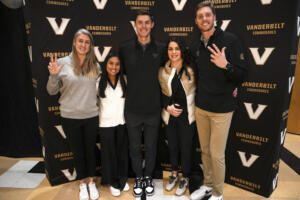
From L to R: Director of operations Kimberly Williams, graduate assistant Andrea Aceveda, Russell Corbelli, Lauren Plum, Anders Nelson (Truman McDaniel/Vanderbilt).
The turn of the year is a tricky time to launch a recruiting effort from scratch. The plan was to build a foundation by bringing in some student-athletes from the high school class graduating next spring. They will preserve their eligibility by redshirting the 2024–25 academic year. A year later, a second class of high school recruits will arrive, and the group will be bolstered by student-athletes from the transfer portal ahead of the program’s on-court debut in fall 2025.
The complication for Vanderbilt was that the high school class of 2024 was well into its junior year by the time Nelson and his staff got into the game in January. As many as three-quarters of the top 100 recruits had already made verbal commitments, and most established programs had largely completed their classes. The Commodores, however, had a database of tens of thousands of student-athletes and a blank slate.
If you wandered through their space in the McGugin Center throughout much of late winter and early spring, you likely would have found them hunched over video—seemingly endless hours of highlight compilations, full matches and curated collections of specific skills.
“If you have an outside hitter and they’re barely hitting over the net, you can be the best human and the toughest worker in the world, it’s still going to be really tough to stick out,” Plum said. “But then if you see a kid who is obviously touching over 10 feet, is explosive off the ground and hits the heck out of the ball? That’s when you start to watch demeanor: Good point or bad point, how do they act? Are they demanding the ball in tough situations? Are they giving a lot to their teammates?
“At that point, you dig deeper and watch more situational film, not just pure highlight film.”
Outside hitters, middle blockers, liberos, setters, opposites—unlike most teams, they weren’t recruiting to fill specific positional needs. It would be nice to end up with at least one of everything, but getting the right people mattered more than the right positions. From video, they reached out to coaches and contacts in the youth ranks, trying to learn more about personality, aspirations and more. That was preparation for contacting the student-athlete, simultaneously trying to make a case for why Vanderbilt is a good fit for them and assess if they are a good fit for Vanderbilt.
“I try to create an environment where if you’re passionate about an athlete, we better hear that,” Nelson said. “While I’ll have the final say usually, this is not a dictatorship where I’m making every call. So it’s important that our staff is on the same page of what we’re looking for, especially in the intangibles. We’re looking for courage. We’re looking for integrity, competitive spirit and growth mindset. When you know those four things are non-negotiable, it becomes easier for Russell or Lauren to plead their case for somebody.”
Every weekend for nearly three months, the three coaches hit the road. Sometimes they traveled together for big events, like Triple Crown, but they also split up to reach as many tournaments and towns as possible. Each week, they reconvened in the office for recruiting meetings. The collaborative energy meant the gatherings invariably spilled over the allotted time and they produced as many new leads to follow as they did answers. But that was part of the point: If the same recruit excited all three of them, they were onto something.
“What has been cool is that all three of us are drawn to really similar traits and personalities in athletes,” Nelson explained. “With this first class, they’re incredibly athletic, incredibly good movers. We may have sacrificed an inch or two in size, but we’re all comfortable with that. We’d rather coach truly elite athletes, in terms of how they move and jump, than trade that for an inch or two more in height. We want to build this around skilled, solid volleyball players.”
The first Commodore
Nelson often talks about the litany of firsts that the early classes will achieve—the first day of practice, first game, first win. But whether it ever shows up in the official record book, the program’s first victory came on Feb. 15, 2023. Before Triple Crown, before much of the recruiting work had even begun in earnest, that’s when Hailee Mack etched her name in Vanderbilt volleyball history as the program’s first verbal commitment.
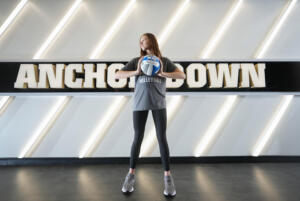 Mack is a highly touted libero with experience in USA Volleyball’s National Team Development Program, and she is the daughter of former Louisville and Xavier men’s basketball coach Chris Mack. She originally committed to Missouri but reopened her search after that program made a coaching change during the fall of her junior year in high school. She’s currently getting an early lesson on building a program as a part of the IMG Academy’s first volleyball team.
Mack is a highly touted libero with experience in USA Volleyball’s National Team Development Program, and she is the daughter of former Louisville and Xavier men’s basketball coach Chris Mack. She originally committed to Missouri but reopened her search after that program made a coaching change during the fall of her junior year in high school. She’s currently getting an early lesson on building a program as a part of the IMG Academy’s first volleyball team.
“The first trait that I think of with Hailee is that she is highly competitive. She just wants to win—a lot,” Corbelli said. “But she is a big relationship person. She saw that growing up with her dad, the relationships that he was able to make with his players. She grew up in that that team setting, and that was something that she really wanted. So me having the connection with her at the beginning definitely helped. But what sealed the deal was how quickly Anders was able to build a rapport with her—because he really didn’t have that much of a relationship with her before we started recruiting her. He made it easy for her to see how our values aligned.”
Any doubt that she was prepared for a work in progress vanished when she and her family visited campus in February. Nelson and Corbelli had had their own campus tours just weeks before, and they played their tour-guide roles with middling success. At one point during Mack’s visit, a facilities employee had to ride to the rescue in a golf cart when the coaches couldn’t find the keys for one of the buildings. Later, they found themselves locked out of the dorm they’d intended to show her.
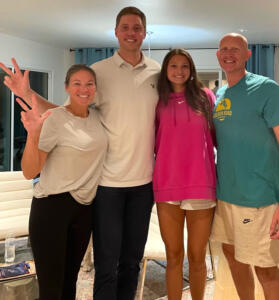 “Thank God this kid likes being around us,” Nelson recalled thinking through the cringing, “Because I don’t know if we’re going to get her otherwise.”
“Thank God this kid likes being around us,” Nelson recalled thinking through the cringing, “Because I don’t know if we’re going to get her otherwise.”
Making the embarrassment that much more acute was having it unfold in front of not just a prize recruit, but someone whose dad had recruited some of college basketball’s biggest stars.
About midway through the tour, Nelson recalled, an amused Chris Mack pulled him aside and told him not to worry about it, reassuring him that, “We don’t care, we’re not those people.”
What mattered more than brick and mortar—especially since the volleyball facilities didn’t even exist yet—was that Mack saw and heard their vision for building something meaningful. When she and her parents eventually departed, Nelson had a good feeling. And sure enough, Mack soon called with good news: She was coming to Vanderbilt.
Not long after Mack made it public, Nelson received a congratulatory message from Kentucky head coach Craig Skinner, who’d been his boss for more than a decade. Skinner told him he would never forget the moment—not only was Mack Vanderbilt’s first commit but Nelson’s first as a head coach.
“It’s pretty cool,” Nelson said. “It’s a bond that Hailee and I will share forever.”
From Triple Crown to Commodores
In January, after Corbelli visited campus and accepted the job, he started reaching out to potential Commodores before he’d even gotten to the Nashville airport to fly home.
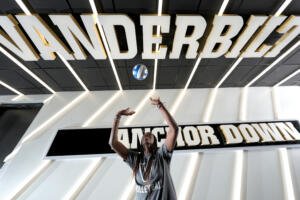 Giovanna Mason was at the top of his list. Corbelli has deep roots in the Texas volleyball community. As a kid, he played for Austin Junior Volleyball, the same club team Mason was a part of years later. Two years ago, he’d coached “Gigi,” as she’s known, at a camp in Austin.
Giovanna Mason was at the top of his list. Corbelli has deep roots in the Texas volleyball community. As a kid, he played for Austin Junior Volleyball, the same club team Mason was a part of years later. Two years ago, he’d coached “Gigi,” as she’s known, at a camp in Austin.
He knew the outside hitter’s boundless potential on the court. More than that, though, he knew her well enough to know she met every one of Nelson’s non-negotiable traits. She might be up for an adventure.
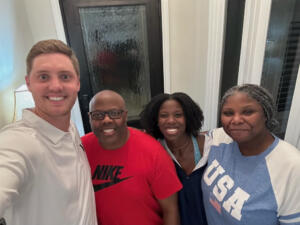 From the outset, the coaches haven’t tried to soft sell the challenge of being first. Student-athletes aren’t joining a program with Final Four history. They aren’t joining a program with any history over the past four-plus decades. The staff initially worried that might be a non-starter for many recruits. And it was, for some. But more players than might have been expected were open to it—even intrigued by it. Because while the coaches couldn’t show recruits where they would play or a case full of trophies and honors earned by student-athletes before them, they could show them a world-class university, an SEC schedule and a chance to live and learn in Nashville.
From the outset, the coaches haven’t tried to soft sell the challenge of being first. Student-athletes aren’t joining a program with Final Four history. They aren’t joining a program with any history over the past four-plus decades. The staff initially worried that might be a non-starter for many recruits. And it was, for some. But more players than might have been expected were open to it—even intrigued by it. Because while the coaches couldn’t show recruits where they would play or a case full of trophies and honors earned by student-athletes before them, they could show them a world-class university, an SEC schedule and a chance to live and learn in Nashville.
They also had a closer. When Mason visited in late February, shortly after Triple Crown and alongside Reese Animashaun and Mack on her return visit, they met with Lee. In fact, the athletic director met with each of the six recruits on their visits.
“For Candice to do that, I’ve never had an AD meet with a recruit,” Corbelli said. “She wants to do things like that. That makes a big impact on them, obviously—it’s cool to meet her. But it’s also symbolic of how much Vanderbilt cares about this and wants this to be great.”
The day after meeting Vanderbilt’s athletic director, Mason verbally committed to Vanderbilt.
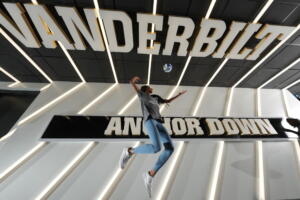 Connections to the Lone Star State also proved useful in the case of Animashaun, who comes from the Houston area. Nelson had long-standing familiarity with her Houston Skyline volleyball club, which sent five student-athletes to Kentucky over the past decade. When the Vanderbilt coaches went into the Triple Crown, Animashaun’s name was atop the list of ideal fits to build a program around. They left even more convinced.
Connections to the Lone Star State also proved useful in the case of Animashaun, who comes from the Houston area. Nelson had long-standing familiarity with her Houston Skyline volleyball club, which sent five student-athletes to Kentucky over the past decade. When the Vanderbilt coaches went into the Triple Crown, Animashaun’s name was atop the list of ideal fits to build a program around. They left even more convinced.
“She showed out that tournament,” Nelson recalled.
They kept talking through the spring. Animashaun seemed open to the unique opportunity and had a good rapport with the Vanderbilt staff, but the standout student was also weighing strong interest from the ACC and Ivy League.
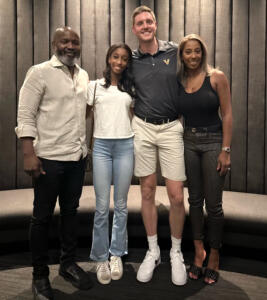 “She definitely sees the value of education,” Corbelli said. “I think the reason she wanted to come to Vanderbilt is because she is highly competitive and also wants to compete at the highest level that she possibly can. She works incredibly hard, is very involved at her school. She’s going to be a really important vocal leader. She has such a good pulse on her environment, the people around her and what they need. And she is so good at keeping joy in all situations.”
“She definitely sees the value of education,” Corbelli said. “I think the reason she wanted to come to Vanderbilt is because she is highly competitive and also wants to compete at the highest level that she possibly can. She works incredibly hard, is very involved at her school. She’s going to be a really important vocal leader. She has such a good pulse on her environment, the people around her and what they need. And she is so good at keeping joy in all situations.”
Planning their strategy for Triple Crown, Nelson told Corbelli and Plum he needed to spend as much time as possible watching student-athletes who were juniors in high school. For most head coaches, those matches aren’t the focus of their attention. By February, they already have that class dialed in. With so many of the top 100 recruits already verbally committed, head coaches need to turn their attention to the ninth- and 10th-graders who will comprise future recruiting classes. Nelson couldn’t follow that script. He needed to get his first class right, even if it meant playing catch-up on subsequent classes.
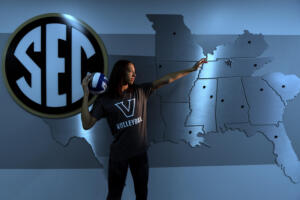 His reward was a richer understanding of that class. An acquaintance from a recruiting service he had known for years, and whose opinion he valued, told him about a middle blocker who was maybe a fraction undersized but athletic and driven to succeed. That’s the kind of description that appeals to Nelson, who at 6-foot-9, likes to joke that he was oversized and unathletic in his playing days. Watching Rachel Ogunleye at Triple Crown, he saw the athleticism, saw how she seemed to float around the court. His interest fully piqued, he had the time to learn more about her as a person— about someone who really wanted to be a Commodore.
His reward was a richer understanding of that class. An acquaintance from a recruiting service he had known for years, and whose opinion he valued, told him about a middle blocker who was maybe a fraction undersized but athletic and driven to succeed. That’s the kind of description that appeals to Nelson, who at 6-foot-9, likes to joke that he was oversized and unathletic in his playing days. Watching Rachel Ogunleye at Triple Crown, he saw the athleticism, saw how she seemed to float around the court. His interest fully piqued, he had the time to learn more about her as a person— about someone who really wanted to be a Commodore.
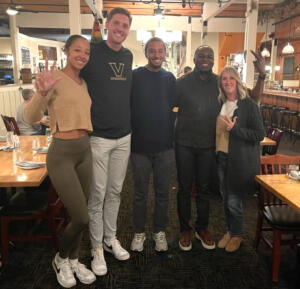 Ogunleye was the last of the six student-athletes to verbally commit to Vanderbilt. But the investment Nelson made in learning this high school class meant no one went overlooked.
Ogunleye was the last of the six student-athletes to verbally commit to Vanderbilt. But the investment Nelson made in learning this high school class meant no one went overlooked.
“Rachel was one of those people who, as the recruiting process went on and we got to know her better, her passion for wanting to be at Vanderbilt just showed through and through,” Nelson said. “We wanted people who understood what this challenge was and still wanted to be here, and Rachel was very excited about that. When she got on campus, she convinced me this is an opportunity she would work her butt off for.”
Going the distance
Much of Vanderbilt’s eventual foundation was present under the same roof when the coaches walked into Triple Crown in February: Mack had already committed, and Animashaun, Mason and eventually Ogunleye joined her in the days and weeks that followed. But finding the right class to be first meant going far beyond Kansas City.
In February, Corbelli received a message from a friend about a setter from northwest Ohio they had spotted at a small tournament the Vanderbilt coaches hadn’t had the bandwidth to attend. The student-athlete didn’t even have much of a social media presence—a rarity for this day and age—but Plum pieced together enough video to be intrigued.
So began Taryn DeWese’s journey to Vanderbilt.
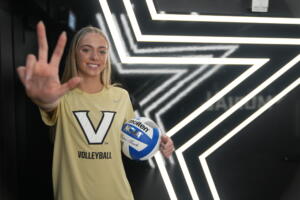 Plum texted her to introduce herself and the program and set up a time to chat on the phone. They talked about Vanderbilt but also about families and life, Plum trying to learn the aspects of personality and spirit that are impossible to see on film. Soon enough, she learned that DeWese had three older brothers—the latter joking that if the call with Plum went on too long, there wouldn’t be anything of dinner left for her to eat.
Plum texted her to introduce herself and the program and set up a time to chat on the phone. They talked about Vanderbilt but also about families and life, Plum trying to learn the aspects of personality and spirit that are impossible to see on film. Soon enough, she learned that DeWese had three older brothers—the latter joking that if the call with Plum went on too long, there wouldn’t be anything of dinner left for her to eat.
Nelson recalled how enthusiastic Plum was about DeWese when she filled in the rest of the staff during one of their regular recruiting meetings. Plum grew up with uber-competitive siblings—after a Vanderbilt staff fall retreat in the North Carolina woods, Nelson and Corbelli readily agreed that she would be the last one standing if they were left stranded in the wild. Sure enough, Plum touted DeWese’s sibling survival instincts as proof of character.
“That’s such a Lauren thing to love,” Nelson chuckled. “But for Lauren to come back so impressed with who she was, that made Taryn move up in my book right away.”
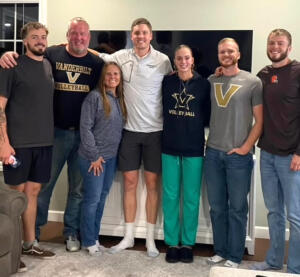 Earlier this fall, DeWese served a perfect set for her high school team in Millbury, Ohio—17 aces en route to serving all 25 points. She lives and breathes the sport and told Plum she wanted to take volleyball as far as she could, maybe even follow Plum’s path to play at a professional level. But mixed in with the big dreams, she worked at a snack bar in what little free time she had to cover the more mundane expenses of life as a teenager.
Earlier this fall, DeWese served a perfect set for her high school team in Millbury, Ohio—17 aces en route to serving all 25 points. She lives and breathes the sport and told Plum she wanted to take volleyball as far as she could, maybe even follow Plum’s path to play at a professional level. But mixed in with the big dreams, she worked at a snack bar in what little free time she had to cover the more mundane expenses of life as a teenager.
“She is just a down to earth, hardworking kid,” Plum said. “And so many things lined up with what I would want in a setter. She has room to grow in skill development, but she has the intangibles. For her high school, she had more than a thousand kills, a thousand assists and almost a thousand digs. She’s an all-around stud. She’s a perfect kid for me to work with for a year. Not having to hit the ground running in the SEC is huge for her development. The world is hers if she wants it, and if she’s willing to work for it.”
DeWese visited Vanderbilt at the same time as Maddy Bowser. Strangers before that moment, one from small-town Ohio and the other from the nation’s capital, they forged an immediate connection that kept them up most of the night talking.
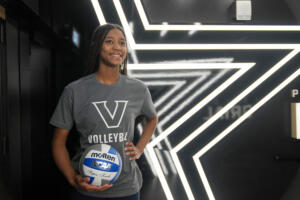 Bowser wasn’t from off the beaten path. Her club, Washington D.C.’s Metro Volleyball, sends double-digit athletes to Division I programs almost every year. In fact, Bowser’s team featured so many formidable middle blockers that college coaches were spoiled for choices—and perhaps at risk of missing someone if they didn’t pay close attention.
Bowser wasn’t from off the beaten path. Her club, Washington D.C.’s Metro Volleyball, sends double-digit athletes to Division I programs almost every year. In fact, Bowser’s team featured so many formidable middle blockers that college coaches were spoiled for choices—and perhaps at risk of missing someone if they didn’t pay close attention.
After watching her play in person for the first time, Nelson approached the sizable family contingent there to support her. When he got to “Nana,” Bowser’s grandmother, she wanted to be sure the coach knew her granddaughter’s middle name: Joy. It felt like a sign.
“The first thing I noticed was how much joy she played with—she just had a blast out there,” Nelson said. “Maddy is someone who picked up the game a little later. And I think that’s one of the advantages of being a late bloomer in the sport—you’re not even close to burned out. So she just had this joy about her while she played.”
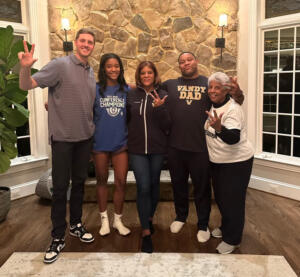 Bowser had opportunities with other established programs in major conferences, more conventional paths. But as she was leaving campus after her official visit to Vanderbilt, she told Nelson that the school was her No. 1 choice and assured him she would be in touch soon.
Bowser had opportunities with other established programs in major conferences, more conventional paths. But as she was leaving campus after her official visit to Vanderbilt, she told Nelson that the school was her No. 1 choice and assured him she would be in touch soon.
“I think we kind of came out of nowhere,” Nelson said. “It was pretty cool for someone to come on campus and, again, we can’t show her a volleyball venue, a trophy, a player she can talk to about the experience. I think we had our jerseys by then, but I’m not even sure. For her to leave falling in love with what Vanderbilt is, it just tells you how connected she felt to this place.”
Countdown to arrival
For the briefest moment early in his time in Nashville, an irrational thought flitted around Nelson’s mind: What if nobody comes? What if the blank canvas remains just that. Blank.
Mack rendered the fear moot. Animashaun, Bowser, DeWese, Mason and Ogunleye banished it forever. Vanderbilt volleyball is back. And for now, even as the coaches busily recruit the class that will join them for the start of play in 2025–26, they are Vanderbilt volleyball.
In the spring, as a challenge and bonding opportunity, Nelson and each of the six recruits picked a habit to change for 21 days. One student-athlete committed to making her bed every morning. Nelson set out to limit screen time on his phone apps. This fall, he visited each of them. They had already verbally committed, already changed their social media bios to include Vanderbilt and posted photos with their future teammates. But choosing Vanderbilt was the beginning of the journey, and the head coach wanted to continue building relationships.
“I learned a lot about how much you get to know somebody in their hometown, in their own high school, sitting around the dinner table with them,” Nelson said. “It’s a unique experience. I think it builds a lot of investment on their end, knowing that we’re committing to getting to know them better. That’s really our job right now—getting them ready for the next level, but also building their investment in this program because they’re going to be the leaders right away.”
With letters of intent signed and fewer restrictions on contact, they will soon begin regular Zoom calls. Time will be devoted to the sort of onboarding they will need to hit the ground running as Vanderbilt students. Because next fall will be here before you know it.
And their attention will turn toward the coaching staff’s terminology and the basics for the system Nelson wants to run, so they can hit the court running.
Because the fall of 2025 will be here before you know it. And Vanderbilt is serious about this class, these six women, adding an NCAA Tournament debut to the long lists of firsts ahead.
“Obviously, we have yet to go through adversity together,” Plum said. “I think it’s really important that you build these strong relationships so that when you do go through adversity, you still see the good in people and they still see the good in us and the opportunity of what we’re building here. And so we’re going to learn and grow together.
“It’s been really cool to see people coming together. They’re as invested in Vanderbilt as we are in them.”
It’s why Nelson felt butterflies all those nights ago in Kansas City.
Somewhere out there were six women who dared to be first.
Vanderbilt was waiting to welcome them, all Nelson had to do was find them.
And now they’re forging their new path to excellence—together.

